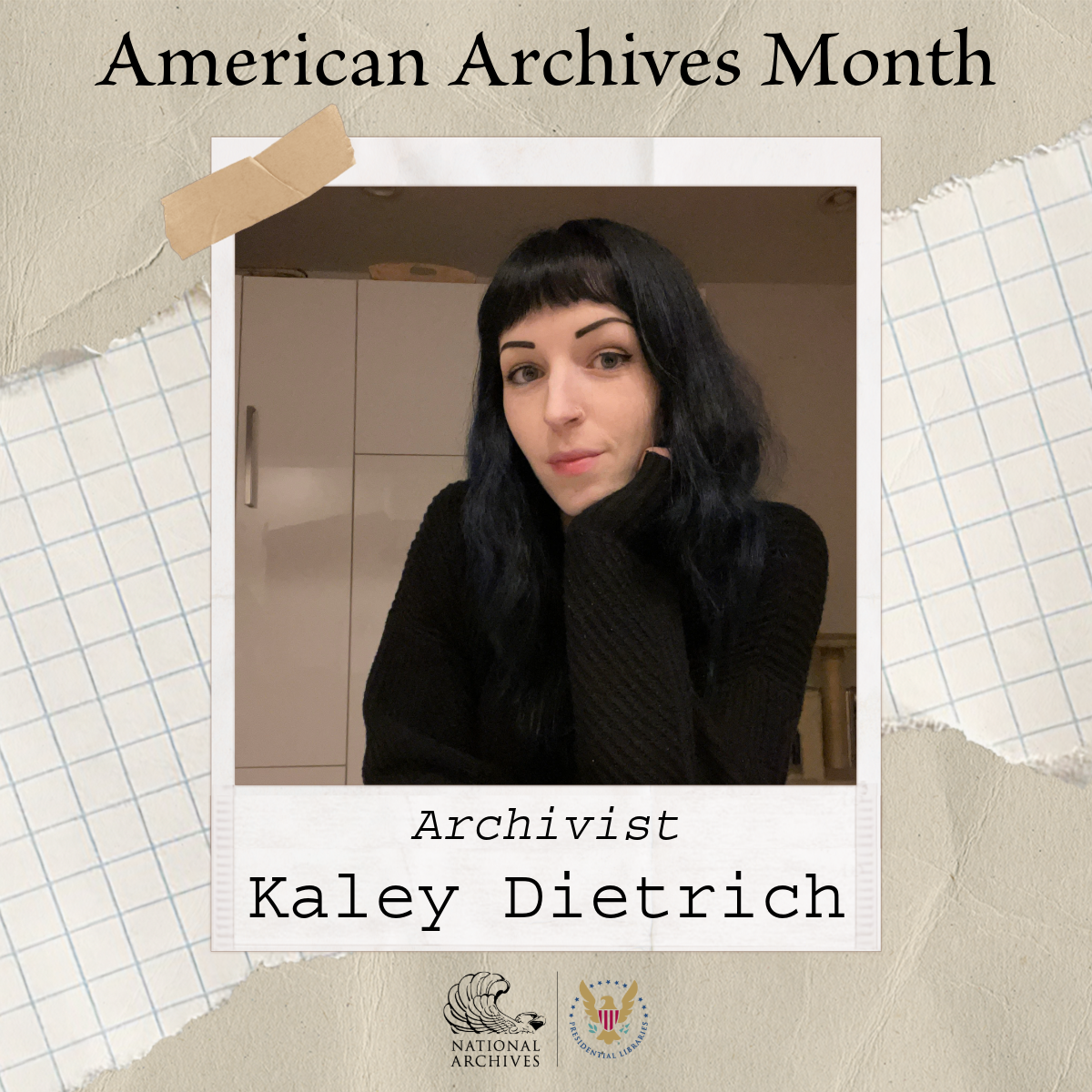
American Archives Month Employee Spotlights - Kaley Dietrich

Name: Kaley Dietrich
Job Title: Archivist in the Archival Operations Division Special Access Team and former Archivist at the Donald J. Trump Presidential Library
How long have you worked at the National Archives?
I joined the National Archives in January 2023.
What made you interested in being an archivist? Why did you want to work at your Presidential Library in particular?
I have a background in history and felt that my perspective as a user of primary source materials would be beneficial in the care and access of records. I decided to seriously pursue the career after an internship with my alma mater's special collections, where I helped create a new collection and curate an exhibit highlighting the new materials.
I chose to work with the Trump Presidential Library because it is a new frontier for how archivists process and provide access to records, particularly for digital records. I saw an opportunity to be involved in setting new standards for the field, and I wanted to challenge myself with a type of record (Presidential) that I had not previously worked with. I enjoy getting into collections from the ground up so that records have a solid foundation that will allow for archivists and users to more effectively work with them.
Give us an overview of your job. What are some of your responsibilities?
As an archivist with the Trump Library I worked with both digital and physical records. I was responsible for processing the physical records from the Office of Administration. This included creating the initial file lists, crafting catalog and location records, and preparing records for digitization by removing staples, organizing materials, and enhancing descriptions. My primary responsibility was with digital and AV records. I developed the standard operating procedures (SOPs) for processing and creating distribution copies of our AV and external media and processed much of our AV collection. I also had a lead role in evaluating born-digital records, like emails and photos, as datasets were made available to us to ensure that files were accessible and rendering properly. I now serve as an archivist with the Special Access Unit, where I will be processing digital special access requests for PRA (Presidential Records Act) Libraries and assisting with FOIA requests.
What’s the strangest thing that’s happened to you in this line of work? What’s the best?
The strangest thing to happen to me in this line of work would be working with an author well known for his writing on cults on one of his new projects. My alma mater in Florida is home to a collection of a local cult, and this author was looking to make larger connections that spanned over 100 years and across the country to another major cult. No one had ever thought to make the connection before, so being able to see inside his thought process, look through primary materials he had gathered outside of formal institutions, and help him with his theory was very surreal but one I will never forget.
The best thing that has happened to me in this line of work would be joining NARA as an archivist. I have had the opportunity to connect with such a wide variety of information professionals that have an incredible passion for what they do and every day has been an opportunity to learn something new. As a history student many years ago, I would have never thought that I would be working with Presidential records in Washington, DC.
What's your favorite document, and why?
My favorite object in the Trump Library collection is a piece of artwork that is described as a real cherry branch with simulated buds and blossoms that also features a bee on a spring. This was a gift from Kim Jung-Sook of South Korea to Melania Trump. This is my favorite object in the collection because I think it’s an incredibly beautiful piece and because it really highlights the range of materials that archivists can work with. While much of our collections are paper based or digital, archivists can often be challenged with delicate pieces of art that also contain organic material, like the cherry branch, that brings new challenges and considerations for preservation.
What advice would you have for someone interested in a career in archival work, or how would you convince someone to consider a career in archival work?
The advice I would give for someone interested in a career in archives would be to focus on subjects that they love. While many archivists have backgrounds in history and English, the field is much more diverse. There are archivists who work in law firms, medical libraries, tech companies, agricultural communities, entertainment companies, and wineries to name a few that require knowledge found in other majors. You do not have to be a history buff or a bookworm to become an archivist; you just need to have a passion for preserving, protecting, and providing access to the histories in your care.
Lastly (and most important), why should people visit or learn more about your Presidential Library?
People should visit and learn more about the Trump Presidential Library’s digital collection because it is a great way to see how preserving history is a continuous process that starts the day that the record is created. Many folks think of “old documents” when they imagine an archive, but the records we create today will one day be those “old documents.” It is important to be proactive by taking steps to ensure that they are preserved early on.